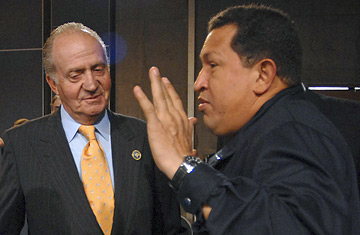
Venezuela's President Hugo Chavez (R) gestures next to Spain's King Juan Carlos during the second working session of the XVII Ibero-American Summit in Santiago, Chile
Few world leaders would consider it a good day if the King of Spain were to tell them publicly to "shut up." But then, few heads of state are as skillful as Venezuelan President Hugo Chávez at turning a foreign diplomatic rebuke to domestic political advantage. Chávez's radical left-wing rule resides in his populist challenge to "imperialist" threats — and what more convenient symbol of colonial oppression for Chávez (besides his favorite, the U.S.) than the Spanish throne, which plundered South America for three centuries before it was thrown out in the 1800s by Venezuelan "Liberator" Simón Bolívar, the namesake of Chávez's Bolivarian Revolution?
That's why Chávez seems less than ruffled at being told by King Juan Carlos, "Por qué no te callas?" — Why don't you shut up? — over the weekend at the Ibero-American Summit of Iberian and Latin American leaders in Santiago, Chile. The king got fed up when the Venezuelan firebrand went on one of his rants and repeatedly accused former Spanish Prime Minister José MariaAznar of being a "fascist" who had supported a 2002 coup attempt against Chávez. Chávez later spun Juan Carlos' outburst as a monarchical affront to democracy (though Juan Carlos was, in fact, key to restoring constitutional rule in Spain after the death of its genuinely fascist dictator, Francisco Franco, in 1975). "The king is a head of state like me," Chávez said, "only I've been elected three times with 63% support."
But behind the royal reprimand, much of the international media missed what may have set Chávez off in the first place. Chávez became visibly irritated at the summit when Spain's current Prime Minister, José Luis Rodríguez Zapatero — a socialist and Chávez ally — insisted that Latin America needs to attract more foreign capital if it's going to make a dent in its chronic, deepening poverty. Chávez blames "savage capitalism" for Latin America's gaping inequality and insists "only socialism" can fix it — hence his tirade against Aznar and other free-market "fascists." At that point Zapatero chided Chávez, reminding him that Aznar himself "was democratically elected by the Spanish people." Chávez kept trying to interrupt — summit organizers even turned off his microphone — at which point the King said what was on most summiteers' minds, if the general applause he got was any indication.
Back in Caracas today, Chávez is conveniently leaving the comments of Zapatero, who is supposed to be one of his leftist kindred spirits, out of the discussion. "What Zapatero said must have really bothered Chávez," says Venezuelan author and Chávez biographer Alberto Barrera. "It broke with the leftist fundamentalism on Latin America that he demands all his allies follow."
And it pointed up a fact about Chávez's revolution that chavistas are too reluctant to acknowledge. Venezuela, with its vast oil wealth, can afford to indulge socialism and eschew foreign investment; but most other Latin American nations can't. Their economic growth still depends on the kind of capital that global competitors like China and India are raking in, but which Latin America seems unable or unwilling to garner. The chavistas rightly argue that the distribution of capitalism's fruits has been grossly unequal in Latin America — which is a large reason why leftists like Chávez have been swept into power in recent years. But the region needs that investment nonetheless — and even leftists like Zapatero sound impatient with the region's mediocre performance.
In that sense, it seems appropriate that King Juan Carlos — head of a nation with major investments in Latin America — got snippy at the Ibero-American Summit. The annual gathering was started in 1991 by then Mexican President Carlos Salinas de Gortari, who at the time was trying to convince the U.S. to sign a free-trade agreement, as a way to make Mexico and Latin America look like global players. Latin leaders still use if for that purpose — but this time the Spaniards may have been less willing to play along. Their frustrations with Latin America, and those of the rest of the developed world, were reflected just before the summit last week in a report by the Paris-based Organization of Economic Cooperation & Development. The OECD called the region's economic showing "sub-optimal," and said even its best performers continue "losing ground to their Asian competitors."
In Venezuela, Chávez's weak political opposition is gleefully playing and replaying video of the summit exchange — especially delighted that the King used the informal, less respectful form of Spanish to address Chávez. They'll no doubt hope to use it to erode support for a raft of controversial constitutional reforms Chávez wants — including the elimination of presidential term limits — before a Dec. 2 referendum. Still, Chávez has come through past diplomatic outrages unscathed — in fact, just weeks after calling U.S. President George W. Bush "the devil" at the United Nations last year, Chávez went on to win reelection in a rout. Sure, even Chávez's friends at the Santiago summit seemed to feel satisfied that he finally received an arrogant gadfly's comeuppance. But anyone who thinks it dealt a significant blow to Hurricane Hugo may be royally deceiving themselves.
With reporting by Gideon Long/Santiago
